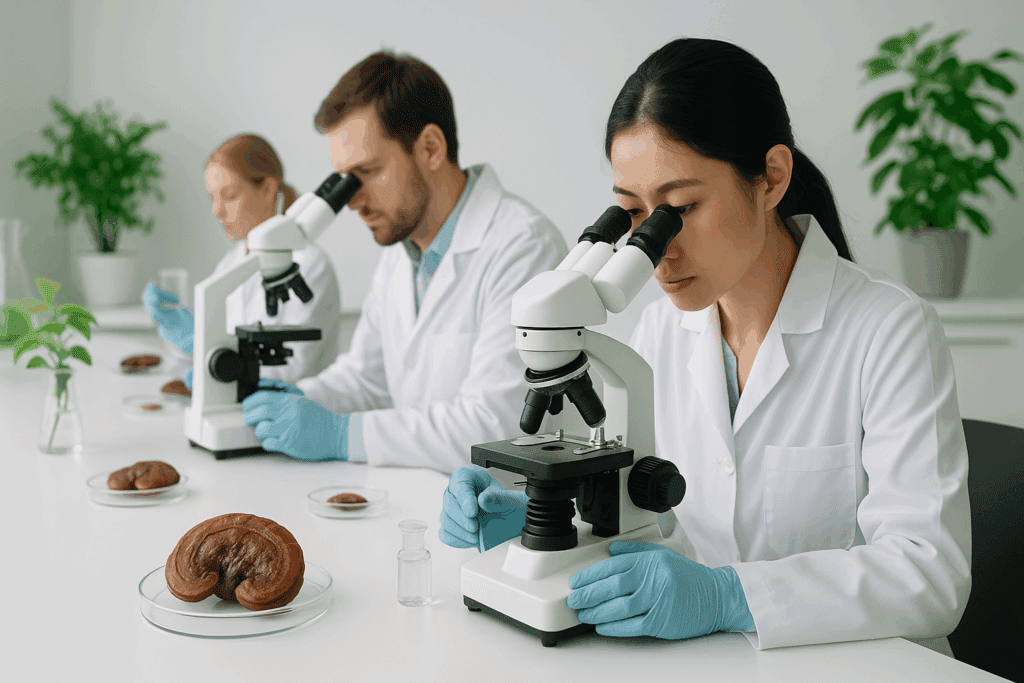The transition into motherhood is a powerful, emotional, and sometimes overwhelming journey, especially in the early stages of breastfeeding. New mothers often seek holistic ways to manage stress, enhance immunity, and support their overall well-being. One increasingly popular natural supplement that has sparked interest among wellness-conscious mothers is reishi mushroom. Known for its calming properties and adaptogenic benefits, reishi has long been revered in traditional Chinese medicine. Yet, questions remain about the safety and effectiveness of taking reishi mushroom while breastfeeding. As interest in natural stress-relief options grows, so does the importance of understanding how such remedies interact with maternal health and lactation.
In this comprehensive article, we explore the essential facts surrounding the use of reishi mushroom while breastfeeding, drawing on scientific evidence, traditional knowledge, and modern medical perspectives. Our goal is to equip new mothers with the knowledge they need to make informed decisions about incorporating reishi into their postpartum wellness routines. We’ll also examine potential risks, the current state of clinical research, expert recommendations, and practical guidance for those considering this adaptogenic mushroom during lactation.
You may also like: The Essential Guide to Reishi Mushroom Benefits: How to Use Reishi Mushroom Powder for Stress Relief and Adaptogenic Support

Understanding Reishi Mushroom and Its Traditional Use
Reishi mushroom, also known as Ganoderma lucidum or “Lingzhi,” has a rich legacy in Eastern herbal medicine. It has been used for over 2,000 years, primarily for its calming, immune-supporting, and longevity-promoting effects. Traditionally consumed in teas, powders, and tinctures, reishi is classified as an adaptogen, meaning it helps the body adapt to stress and restore balance without targeting any one specific system. Its bitter taste and woody texture make it unsuitable for culinary use, but its medicinal applications are widely celebrated.
The mushroom contains bioactive compounds such as triterpenoids, polysaccharides, and peptidoglycans that contribute to its purported benefits. These compounds are believed to reduce inflammation, combat oxidative stress, support liver function, and enhance immune response. Importantly, these benefits appeal to postpartum women who may be facing hormonal fluctuations, emotional stress, and physical fatigue. The potential for reishi to serve as a natural stress-reliever and energy stabilizer makes it especially appealing for those navigating the demands of breastfeeding.
While reishi has been revered in ancient systems of medicine, its transition into Western wellness circles has prompted scientific inquiry. Researchers are now exploring its pharmacological effects, though much of the evidence remains preliminary. Still, interest continues to grow, especially among health-conscious mothers eager to explore plant-based options for self-care.

Reishi Mushroom While Breastfeeding: A Look at the Scientific Evidence
Scientific research into the safety of reishi mushroom while breastfeeding remains limited. Most studies on reishi have been conducted on animals or general adult populations, often excluding pregnant or lactating individuals due to ethical considerations. This creates a gap in clinically verified data, making it difficult to establish definitive guidelines for reishi use during breastfeeding.
Despite the lack of targeted studies, what we do know about reishi’s active compounds can help inform safe practices. Reishi’s immunomodulating effects may offer postpartum benefits, especially given that breastfeeding mothers often experience immune suppression. Moreover, reishi has shown potential in regulating cortisol levels, which could support emotional balance and resilience against postpartum stress and anxiety.
However, the absence of long-term studies on breastfeeding women means we must rely on indirect evidence and expert consensus. Medical professionals typically advise caution with herbal supplements during lactation, even those with a long history of use. Because the active constituents in reishi may pass into breast milk, the impact on the infant—particularly regarding immune development or allergen sensitivity—remains unknown.
That said, no conclusive evidence has identified reishi mushroom as harmful during breastfeeding. Anecdotal reports and case studies suggest that low doses used short-term may be well-tolerated, but clinical validation is still pending. Until then, caution, moderation, and consultation with a qualified healthcare provider are strongly recommended.

Why New Mothers Turn to Reishi for Stress-Relief and Immunity
The postpartum period is often characterized by chronic sleep deprivation, emotional fluctuations, and heightened responsibilities. These conditions can contribute to increased cortisol levels and a weakened immune system. For many mothers, especially those prioritizing natural wellness strategies, reishi presents an attractive option. Its stress-modulating properties are among its most cited benefits.
Triterpenes in reishi are thought to inhibit histamine release and calm the central nervous system, which can help ease anxiety and promote relaxation. This effect is particularly beneficial during the breastfeeding period, when hormonal shifts can intensify emotional sensitivity. Moreover, reishi’s adaptogenic function may enhance physical stamina, allowing new mothers to better cope with the physical demands of childcare.
In addition to emotional well-being, immunity is a top priority for postpartum women. The beta-glucans in reishi are known to stimulate macrophage activity, potentially supporting the body’s defense mechanisms. Some mothers also report improvements in energy levels, mental clarity, and sleep patterns when using reishi as part of a balanced routine.
Given these potential benefits, it’s no surprise that reishi and breastfeeding are increasingly discussed together in wellness forums and among holistic practitioners. However, the decision to use reishi during this critical period should be grounded in individualized medical guidance and a thorough understanding of its possible implications.

Potential Risks and Contraindications of Reishi Mushroom During Lactation
Even natural supplements like reishi are not without risks, especially when used during sensitive life stages like lactation. While many of its compounds are regarded as safe in healthy adults, their effect on a developing infant remains largely speculative. The primary concern with using reishi mushroom while breastfeeding lies in its potential to transfer active compounds to the baby via breast milk.
Certain individuals may experience allergic reactions to reishi, which could manifest as skin rashes, digestive discomfort, or respiratory issues. If a nursing mother consumes reishi and her infant develops unusual symptoms—such as rash, irritability, or feeding difficulties—it may indicate a sensitivity to the compounds being transmitted through milk. In such cases, immediate discontinuation and medical evaluation are warranted.
Another potential issue is reishi’s effect on blood pressure and clotting. Known to have mild anticoagulant properties, reishi may interact with medications such as blood thinners or antihypertensives. For mothers recovering from labor complications or surgery, these interactions could pose a safety concern. Furthermore, reishi’s impact on hormone levels, though subtle, may interfere with the delicate endocrine balance required for milk production in some women.
Given these possible risks, healthcare providers generally err on the side of caution, advising minimal or no use of herbal adaptogens during breastfeeding without medical oversight. While many mothers tolerate small doses well, every body responds differently, and what is benign for one may not be for another. A personalized, evidence-informed approach is the best safeguard for both mother and child.

The Role of Adaptogens in Postpartum Health: Where Reishi Fits In
Adaptogens are non-toxic plants and fungi that help the body resist stressors of all kinds—physical, chemical, and biological. They function by supporting adrenal health, balancing hormones, and enhancing resilience. Reishi mushroom is a standout among adaptogens for its calming, restorative properties, making it a potentially valuable ally in the postpartum period.
New mothers often face a cascade of physical and emotional challenges after childbirth. From hormonal shifts to disrupted sleep cycles and the pressures of infant care, these stressors can affect both maternal well-being and breastfeeding outcomes. Adaptogens like reishi offer a way to modulate the stress response and support holistic recovery, though they should never replace medical care or sound nutrition.
Reishi’s gentle action is especially suited to the postpartum phase, as it does not overstimulate the nervous system like caffeine or other energy boosters. Instead, it works gradually to restore equilibrium. For breastfeeding mothers, this subtlety is an asset—it means less risk of disrupting milk production or overwhelming a sensitive system. Yet, the decision to include reishi should be made with care, taking into account individual health status, diet, and any concurrent medications.
Other adaptogenic mushrooms such as lion’s mane or cordyceps are also gaining attention for postpartum use, but reishi remains the most thoroughly studied in terms of immune and stress support. When used wisely, it may help bridge the gap between conventional medical care and natural wellness practices, offering a safe middle path for mothers seeking balance.
How to Use Reishi Mushroom While Breastfeeding Safely and Effectively
If you’re considering incorporating reishi mushroom while breastfeeding, the first step is always to consult your healthcare provider—preferably one with knowledge of both conventional and integrative medicine. Assuming you receive the green light, starting with the lowest possible dose is key. Many supplements come in capsule, tincture, or powder form, each with different potencies. It’s advisable to use products from reputable companies that test for purity, heavy metals, and contaminants.
Begin with small quantities—perhaps half the recommended adult dose—and monitor both your response and your baby’s. Look for changes in your mood, digestion, or lactation, and observe whether your baby exhibits any signs of sensitivity. Should any unusual symptoms arise, pause supplementation and consult your provider.
Reishi is best taken in the morning or early afternoon, as its calming effect may aid in setting a grounded tone for the day. Some mothers prefer using it in tea form, especially when combined with other soothing herbs like chamomile or lemon balm. However, avoid combining multiple new supplements at once, as it makes it difficult to identify the source of any adverse reactions.
Nutritionists and herbalists often recommend cyclical use—such as taking reishi for two weeks followed by a week off—to minimize any potential for tolerance buildup or endocrine disruption. Pairing reishi use with a nutrient-dense diet, hydration, and adequate rest can enhance its benefits and support a more comprehensive postpartum recovery.
Common Myths About Reishi and Breastfeeding Debunked
As with many wellness trends, myths and misconceptions abound when it comes to reishi mushroom breastfeeding practices. One of the most common is the belief that natural means safe. While reishi is indeed natural and has a long history of traditional use, it is still pharmacologically active and must be treated with respect, especially during breastfeeding.
Another widespread myth is that reishi can directly increase milk supply. While reducing stress and supporting endocrine balance may indirectly promote more consistent lactation, there is no scientific evidence that reishi is a galactagogue—a substance that stimulates milk production. Relying on reishi for this purpose could detract from more effective and evidence-based lactation supports, such as frequent nursing and proper latch techniques.
Some proponents claim that reishi improves infant immunity through breast milk transmission. While it’s plausible that certain compounds could reach the infant, this assumption lacks robust scientific backing. It’s important not to overstate benefits based on anecdotal experiences or preliminary findings. Science must catch up before such claims can be responsibly promoted.
Lastly, the idea that reishi must be taken daily for results can lead to excessive use. Adaptogens are most effective when used in cycles or as needed, allowing the body to recalibrate naturally. Understanding the nuances of how reishi functions, and debunking these myths, is essential to using it wisely during such a vulnerable time.
Integrating Reishi Mushroom Into a Postpartum Wellness Plan
For new mothers seeking to build a sustainable and nurturing postpartum wellness plan, reishi may serve as a supportive ally when used alongside other foundational practices. Nutrition, rest, emotional support, and appropriate medical care should always take precedence. However, when stress becomes chronic or overwhelming, carefully selected herbal supports like reishi can offer meaningful relief.
Integrating reishi into a wellness plan might include using it during particularly stressful periods, such as during growth spurts, sleep regressions, or transitions back to work. Paired with mindfulness practices such as yoga, journaling, or breathing exercises, reishi may enhance emotional resilience and reduce burnout. It is also worth noting that traditional Chinese medicine often combines reishi with complementary herbs to achieve synergistic effects—something that a trained herbalist can guide you through safely.
Creating a postpartum plan that includes herbal support requires reflection, research, and sometimes trial and error. No single approach works for everyone, and what supports one mother may not suit another. Yet the principle of mindful experimentation, guided by professional advice and self-awareness, can help each woman find the tools she needs for her own healing journey.
Frequently Asked Questions About Reishi Mushroom While Breastfeeding
Can reishi mushroom affect the flavor or consistency of breast milk?
While there’s no definitive scientific data confirming that reishi mushroom alters breast milk composition, anecdotal reports suggest it may subtly influence milk taste or flow in some individuals. Certain bitter compounds in reishi, like triterpenes, could hypothetically pass into breast milk and affect its palatability, although such changes are likely to be minor. Some breastfeeding mothers have noted a slightly earthy taste in their milk while taking herbal supplements, though this hasn’t been linked to any negative infant response. Because babies are highly sensitive to flavor shifts in breast milk, even slight changes could affect feeding behavior in rare cases. If a nursing baby becomes fussy or refuses to feed during reishi use, pausing supplementation may be a prudent first step.
What’s the difference between taking reishi as a tea versus a capsule during lactation?
Tea and capsules differ significantly in how reishi mushroom compounds are absorbed and metabolized. Reishi tea, made by simmering slices or powder in hot water, typically yields a lower concentration of bioactive triterpenes due to heat sensitivity, but allows for a gentler, more gradual introduction to the body. Capsules, on the other hand, often deliver a more potent dose, particularly when standardized extracts are used, which may increase the likelihood of both benefits and side effects. For breastfeeding mothers, starting with tea may offer a lower-risk method to assess tolerance before transitioning to concentrated forms. Additionally, teas offer hydration benefits and may create a calming ritual that supports stress relief during postpartum recovery.
Is there a recommended waiting period postpartum before starting reishi mushroom?
There is no universally agreed-upon waiting period, but many herbalists recommend delaying the use of adaptogens like reishi mushroom until after the initial six weeks postpartum. This early period, often referred to as the fourth trimester, is a time of hormonal recalibration, uterine healing, and milk supply establishment, all of which can be disrupted by introducing new supplements too soon. Once a stable breastfeeding rhythm has been established and both mother and baby are thriving, reishi may be introduced under medical guidance. Starting too early could complicate recovery or interfere with the body’s natural hormonal trajectory. Therefore, timing is critical, and a gradual introduction after this initial phase may provide the best results with minimal risk.
How does reishi compare to other adaptogenic mushrooms during breastfeeding?
Among adaptogenic mushrooms, reishi is typically regarded as one of the gentler options, making it a more popular candidate for cautious postpartum use. Others like cordyceps are known for their energizing effects, which may not suit the calming needs of a breastfeeding mother, especially one already experiencing sleep disturbances. Lion’s mane, though promising for cognitive support, has less research surrounding its safety during lactation. Reishi’s historical use, anti-inflammatory profile, and soothing effects provide a more balanced fit for postpartum wellness. However, all mushrooms affect individuals differently, and mothers should always prioritize personal response, infant behavior, and expert consultation over trend-based decisions.
Can long-term use of reishi mushroom during breastfeeding cause hormonal imbalances?
Although reishi is generally considered a mild adaptogen, long-term use—especially in high doses—may influence hormone regulation due to its interaction with the endocrine system. While these effects are typically beneficial for balancing cortisol and supporting adrenal recovery, excessive use could potentially suppress or overstimulate hormone production over time. For lactating mothers, whose hormones are already in flux, this could theoretically affect mood stability or milk supply. To avoid these issues, herbalists often recommend cycling reishi use and observing for signs of overstimulation or fatigue. Monitoring menstrual return, mood changes, and lactation patterns can help determine whether reishi is contributing to hormonal shifts that warrant reassessment.
Exploring Emotional Well-Being: The Psychological Impact of Reishi Mushroom While Breastfeeding
One of the most intriguing yet under-discussed dimensions of using reishi mushroom while breastfeeding is its potential psychological influence. Some new mothers report improved emotional resilience, greater mental clarity, and more peaceful moods, likely due to reishi’s interaction with the hypothalamic-pituitary-adrenal (HPA) axis. This may provide subtle support in navigating the emotional turbulence of new motherhood, reducing feelings of overwhelm or irritability. While reishi should never replace formal mental health support, its mood-modulating effects can complement therapy, mindfulness practices, or counseling. As reishi gently tempers stress responses, it may help new mothers feel more grounded, especially when daily routines feel chaotic or unpredictable.
Are there any cultural or traditional postpartum practices involving reishi and breastfeeding?
In traditional Chinese medicine (TCM), reishi—known as Lingzhi—has been used postnatally to support what practitioners call “shen” or spirit-mind equilibrium. While not always specifically paired with breastfeeding, reishi has been valued for restoring vitality, calming the heart, and supporting blood and qi after childbirth. In some East Asian cultures, reishi is brewed into restorative broths or tonic teas given to women during their confinement period to enhance recovery. These traditions emphasize moderation and balance, often combining reishi with other herbs that harmonize its effects. Learning from these cultural frameworks can inform a more intentional, ritualistic approach to using reishi during the modern postpartum experience.
What role can partners play in supporting reishi and breastfeeding decisions?
Partners can be powerful allies in supporting safe and mindful reishi use during breastfeeding. They can assist by researching reputable brands, reminding mothers to track symptoms or mood changes, and helping to monitor the baby’s behavior for any subtle shifts. This collaborative approach can reduce decision fatigue, especially when new mothers feel overwhelmed or unsure about supplement choices. Partners may also help create a supportive environment for reishi consumption, such as preparing a daily tea or encouraging breaks for rest and reflection. Their involvement reinforces shared responsibility for postpartum wellness, contributing to emotional stability and informed, ongoing dialogue about reishi and breastfeeding.
What does the future hold for research on reishi mushroom breastfeeding safety?
The scientific exploration of reishi mushroom breastfeeding safety is still in its infancy, but emerging trends suggest a promising future. Advances in metabolomics and breast milk pharmacokinetics may soon allow researchers to track how reishi compounds move through the maternal-infant system with greater precision. Additionally, as demand for evidence-based herbal support grows, institutions may begin to prioritize longitudinal studies involving lactating individuals, particularly in integrative health settings. Collaborations between ethnobotanists and medical researchers could also shed light on underdocumented traditional uses of reishi in postpartum care. In the coming years, we may see better dosing guidelines, clearer safety thresholds, and more personalized recommendations for using reishi during lactation.
Safety Monitoring and Infant Sensitivity: When to Discontinue Reishi Mushroom While Breastfeeding
While rare, there are instances when discontinuing reishi mushroom while breastfeeding becomes necessary to protect infant well-being. If a baby develops unusual symptoms such as disrupted sleep, gastrointestinal discomfort, skin irritation, or sudden feeding aversions, it may be a signal of sensitivity to reishi compounds passed through milk. Similarly, if a mother experiences dizziness, hormonal fluctuations, or prolonged fatigue after starting reishi, it’s advisable to reassess her regimen. Keeping a supplement journal can be especially helpful for tracking onset of changes relative to reishi use. Consultation with a lactation consultant or integrative physician can then determine whether to reduce dosage, adjust timing, or discontinue altogether. Above all, maternal instinct and infant cues remain essential indicators in guiding safe and responsive supplement decisions.
Conclusion: Balancing Wellness and Safety with Reishi Mushroom While Breastfeeding
Navigating the use of reishi mushroom while breastfeeding requires both curiosity and caution. On one hand, reishi offers a rich array of potential benefits—from stress relief to immune support—that align closely with the needs of postpartum women. On the other, the absence of robust clinical data demands a careful, individualized approach that prioritizes both maternal health and infant safety.
As new mothers seek natural pathways to resilience and well-being, reishi continues to intrigue and inspire. Yet, it should never be viewed as a cure-all or substitute for foundational health practices. Its value lies in its subtlety—in helping restore balance during one of life’s most transformative stages. Used mindfully, reishi may serve as a gentle yet powerful ally in the journey of motherhood, offering strength not through force, but through quiet restoration.
Ultimately, the decision to use reishi mushroom while breastfeeding must be informed, intentional, and grounded in both science and self-awareness. When approached this way, it becomes not just a supplement, but a symbol of empowerment—an example of how nature and knowledge can come together to support the incredible work of new mothers everywhere.
Further Reading:
Can I take functional mushrooms while pregnant or breast feeding?
Safety and Effectiveness of Medicinal Mushrooms in Pregnancy: postpartum support
